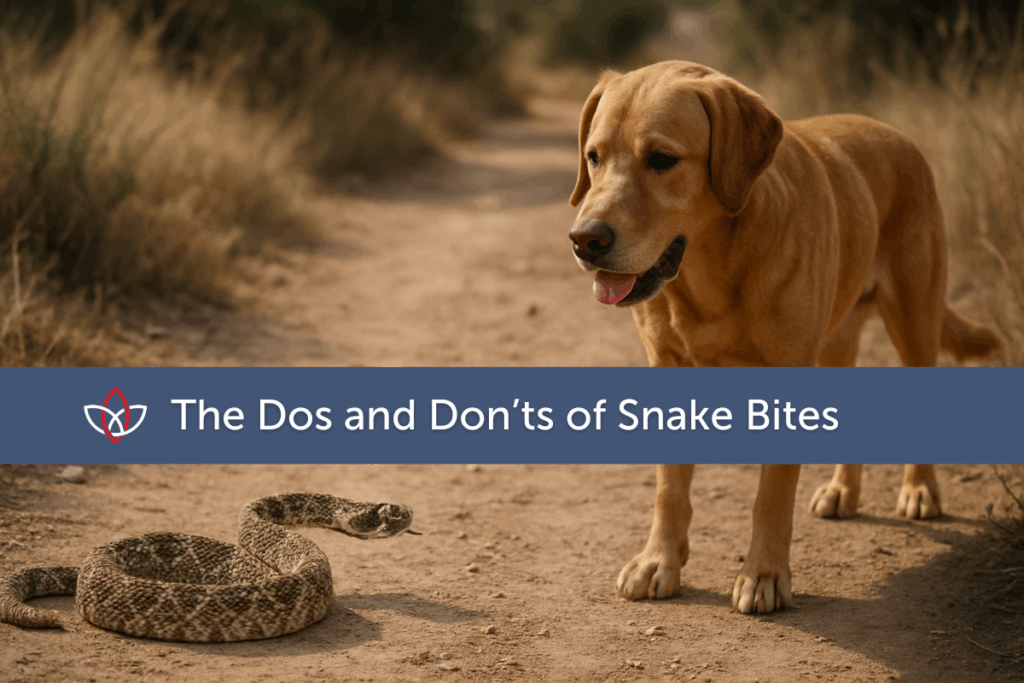
You let your dog out for their evening bathroom break, and minutes later they come limping back to the door with a swollen, painful-looking muzzle. Your heart sinks as you think the worst. Snake bites on dogs are a nightmare, especially if you live in areas where snakes are common. But knowing how to respond could save your friend’s life.
The most important thing to remember is that ALL snake bites are medical emergencies. No exceptions, no “wait and see” approach, and no home remedies. Dr. Leah Simons, an Emergency Veterinarian at Partner Veterinary Emergency and Specialty Center in Richmond, Virginia shares the most important things you need to know to be prepared.
How Do I Know If My Pet Was Bitten?
The tricky thing about snake bites is that you probably won’t actually see it happen. Most pets get bitten while they’re exploring outside, often when we’re not watching. And whatever you do, don’t go looking for the snake afterward—that’s just putting yourself in danger, too. What you should do is identify the bite, but what does a snake bite look like on a dog?
Watch for these telltale signs:
- Sudden, intense pain (your pet may cry out, limp, or become very agitated)
- Asymmetrical swelling (one side of the face or a single paw that’s noticeably larger)
- Bruising around the affected area
- Visible puncture wounds or bloody discharge
Because snakes strike defensively when they feel threatened, bites almost always happen on the parts of your pet that get too close—usually the nose, face, or front paws.
What Exactly Does Snake Venom Do?
Understanding what’s happening inside your pet’s body helps explain why snake bites on dogs and cats are so serious. Venom isn’t just painful, it causes severe, progressive swelling and bruising that spreads from the bite site. But the real danger lies in what you can’t see. Snake venom attacks your pet’s blood clotting system, destroying platelets and the proteins that help blood clot normally. This can lead to dangerous bleeding anywhere in the body, and can sometimes be severe enough to require blood transfusions. Without treatment, this can become life-threatening very quickly. In rare cases, we can see delayed issues with necrosis and infection at bite sites, but this is an uncommon complication.
The Critical Dos: Your Emergency Action Plan
If you suspect your pet has been bitten, immediately do the following two things:
- Remove Anything Restrictive: Take off collars, harnesses, or any clothing. As swelling progresses, these items can become tourniquets and cut off circulation.
- Get to Emergency Vet ASAP: Don’t call to ask if you should come in and don’t stop for anything. Just go. Time is absolutely critical with snake bites on cats, dogs, and any other animal.
The Dangerous Don’ts: Common Mistakes That Make Things Worse
The most important thing for you to know is that there is NO safe at-home management that can be done for venomous snake bites on dogs or cats. There’s a lot of misinformation out there about snake bite treatment, and some of these “helpful” remedies can actually harm your pet or delay critical care.
What NOT to do:
- Don’t Ice the Bite: It can actually worsen tissue damage and doesn’t help with venom spread.
- Don’t Use Tourniquets: These can cut off blood flow and cause additional tissue damage.
- Don’t Try Extraction Kits of Suction: These don’t work and can introduce bacteria.
- Don’t Give Medications: Antihistamines, antibiotics, rattle snake vaccines, NSAIDs, and steroids can also be extremely harmful or ineffective. There is absolutely no use for these medications in the early stages of a snake bite and you may be either delaying necessary treatment or doing something that could be harmful to your pet.
There is absolutely ZERO safe at-home management for snake bites on cats or dogs. The internet might tell you otherwise, but these treatments can harm your pet or give you false confidence when you should be rushing to emergency care.
What Happens at the Emergency Clinic?
When you arrive at Partner, your pet becomes an immediate priority. You can expect the following:
Immediate Assessment
We quickly evaluate your pet’s condition and in almost every case we administer opioid pain medication and can quickly provide emergency treatment if there are any signs of shock.
Blood Work
Tests to assess for bleeding disorders caused by the venom is always recommended and the veterinarian may recommend additional testing based on your pets specific history and exam findings.
Monitoring and Support
Most snake bite patients need hospitalization for careful monitoring, IV fluids, pain management, and serial blood tests due to the dynamic nature of the venom effects as it circulates throughout the body.
The Real Hero—Antivenom
We keep antivenom in stock because it’s the only true antidote to snake venom. This specialized infusion provided to hospitalized patients will treat the pain, swelling, and bleeding disorders caused by the venom. It is most effective within the first several hours after a bite but can be used at any time after an envenomation if ongoing issue are occurring.
The Bottom Line
Snake bites on dogs and cats don’t get better on their own. The venom is actively working against your pet’s body from the moment of the bite, and only professional veterinary intervention can stop that process.
While we can’t prevent every snake encounter, we can make sure you’re prepared to respond correctly if it happens. Recognize the signs, remove restrictive items, and get to emergency care immediately. Remember, every minute counts. When in doubt, don’t wait. We’d much rather see a pet who turns out to be okay than miss the critical window for treating a real snake bite emergency.
Should you find yourself in a veterinary emergency, call us and we can help!
Frederick location: 301.200.8185
Richmond location: 804.206.9122
